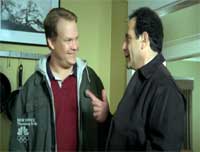The ratings are in. The first outing for NBC's Sunday-night duo of recycled Monk and Psych episodes (first seen on USA Network) drew only 5.6 million and 4 million viewers, respectively, and only a fraction of that in the coveted younger demographic. So should the strike-induced move be considered a failure, or a success?
Yes.
It's a failure because, by broadcast network standards, those aren't exciting numbers. NBC's own Friday Night Lights averaged more than 6 million viewers for the season, yet was renewed by the network only because it found a way to share costs with DIRECTV. Even Dexter, the Showtime cable series now shown on CBS on Sundays, does better than the NBC recycled offerings. Last time out, the recycled CBS showing of Dexter drew 7.1 million viewers, a much healthier showing.
So when Monk and Psych wind up a distant fourth in the young demographic, and don't even do that well overall, that's an outright failure, right? Not necessarily.

First of all, the broadcast audiences for Monk and Psych, relatively small as they are, are much bigger than the audience levels they earn on cable. Dexter on CBS is seen by about seven times as many people as the number that watched season one on Showtime. In terms of exposure, and crossover audience back to the cable sister network, that's publicity you can't buy. And NBC's chosen Monk opener was a good one, showcasing guest star Andy Richter and presenting both the comic and dramatic elements of Tony Shalhoub's disordered detective.
In the cable world, buzz doesn't always equate to ratings anyway -- or is relative to that smaller universe. Friday's final-season premiere of Sci Fi Channel's Battlestar Galactica, for example, attracted 2.1 million viewers to its initial airing. For cable, that's a hit. For broadcast, that'd be an embarrassing, instantly cancelled miss.
But while these "repurposed" cable shows help the cable networks that originated them, do they really help the broadcast networks? When they're better shows, you'd like to think so. But what the networks aren't considering, much less measuring, is critical and audience perception of these shows.

TV critics aren't going to pay much attention to the CBS Dexter or the NBC Monk, other than an initial story on what's edited for broadcast standards. They've literally seen it all before. And viewers, too, I suspect, perceive the shows as reruns, just from another source. What broadcast TV needs, now more than ever, is originality -- not repackaging and repurposing.
Here's a prediction. This fall, when DIRECTV gets to televise episodes of Friday Night Lights months before NBC shows them, TV critics will review the DIRECTV premieres, and all but ignore the shows once they're repeated on NBC. The broadcast ratings will be even lower than they were this season, because any of the show's fervent fans with access to DIRECTV will have seen the episodes already. And NBC will look at the ratings and conclude they should have dumped the series in the first place.
That's the wrong lesson. Making that show in the first place -- like making 30 Rock -- is one of the few good moves NBC has made the past couple of years. Showing them in, and as, the second place, is a lot less commendable.